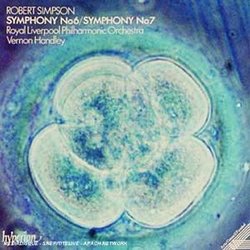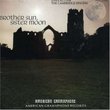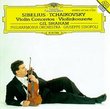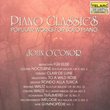| All Artists: Robert Simpson, Vernon Handley, Royal Liverprool Philharmonic Orchestra Title: Simpson: Symphony Nos. 6 & 7 Members Wishing: 1 Total Copies: 0 Label: Hyperion Release Date: 4/19/1993 Album Type: Import Genre: Classical Styles: Historical Periods, Modern, 20th, & 21st Century, Symphonies Number of Discs: 1 SwapaCD Credits: 1 UPC: 034571162805 |
Search - Robert Simpson, Vernon Handley, Royal Liverprool Philharmonic Orchestra :: Simpson: Symphony Nos. 6 & 7
 | Robert Simpson, Vernon Handley, Royal Liverprool Philharmonic Orchestra Simpson: Symphony Nos. 6 & 7 Genre: Classical
These are two of the most extraordinary British symphonies to emerge since the Second World War. Simpson (b. 1921) tends to build his ideas as musical cells, but one will be motile, while the other is static. He will combi... more » |
Larger Image |
CD DetailsSynopsis
Amazon.com These are two of the most extraordinary British symphonies to emerge since the Second World War. Simpson (b. 1921) tends to build his ideas as musical cells, but one will be motile, while the other is static. He will combine these and then let them evolve. It only seems atonal, but it isn't. Simpson lets the music emerge or submerge when it wants to. You can hear hints of Sibelius's moodiness, but beyond Sibelius, you won't be able to identify anybody other than Simpson. Hyperion is releasing all of Simpson's symphonies as well as his string quartets. Start here with these masterpieces. --Paul Cook Similarly Requested CDs
|
CD ReviewsTwo symphonies, so contrasting and yet typical for Simpson Crt Sojar Voglar | Ljubljana, Slovenia | 03/04/2004 (5 out of 5 stars) "When I first listen to this CD, I was surprised. How can a composer write two so different symphonies and yet they are so typical for Simpson's musical language? That really amazed me as both symphonies are masterpieces in their own way. Simpson's sixth symphony is perhaps (at least to me) its finest achivement in the orchestral media by this composer. A single, 28-minute movement does not have a slow movement. Not only that, nearly the entire symphony is in the same tempo, which makes it more unique; the contrasts are only in the expression. Another thing is the tonally simple organisation of twelve-tone system (an opening theme is using a pairing of minor third and perfect fifth, which would suggest the influence of Lutos³awski, but the sound is completely different). Although there are some similarities with Shostakovich, especially in the orchestration, Simpson has really written a great work, which is one of true masterpieces of late 20th century. The seventh symphony has left me a bit confused; what a difference! What was Simpson thinking? Its contemplative atmosphere and a bit rude, elemental sound with relatively small orchestra (a 2, typical for Mozart), centred around tone C sharp with many interesting sonic placings of winds in high pitches makes the symphony unique in another aspect. Not in the terms of traditional movement form (it is the single movement as the sixth), but in the aspect of psychological approach towards the content. Vernon Handley is a fenomenal conductor; while he's not much famous conductor in the world, he is certainly a master conductor for large scale symphonies like of Mahler, Bruckner and Shostakovich. And Simpson's symphonies rightfully join these masters of symphonic writting. The recordings are awesome, thrilling and powerful. Highly recommended." Two one-movement symphonies Geoffrey Brock | London United Kingdom | 01/10/2001 (5 out of 5 stars) "Simpson's sixth and seventh symphonies were both written in 1977 and are in single movements.The sixth, in two parts, is founded on the concept proposed by Carl Nielsen that music is the sound of life, and the whole symphony is based on two tiny musical cells. These seems to grow naturally and inevitably into a mature structure culminating in a thrilling chord.The seventh, in three sections, is based on a tight harmonic structure. However, as Simpson himself said, "it doesn't matter if you can't tell a fifth from a rissole", and listeners untrained in the intricacies of harmony will have no trouble following the musical argument, carried along by the exciting and powerful sounds.As with the other discs in the Hyperion cycle of Simpson symphonies, Handley and the RLPO play excellently an the recording quality is extemely good."
|

 Track Listings (23) - Disc #1
Track Listings (23) - Disc #1




![Across The Universe [Deluxe Edition]](https://nationalbookswap.com/cd//m/51/1251/1241251.jpg)



